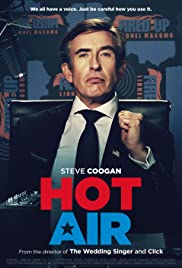
HOT AIR
US, 2018, 99 minutes, Colour.
Steve Coogan, Taylor Russell, Neve Campbell, Griffin Newman, Pico Alexander, Tina Benko, Judith Light, Skylar Astin, John Rothman.
Directed by Frank Coraci.
Here is an opportunity for Steve Coogan (a versatile actor but very well known for his television comic personality, Alan Partridge) to perform as a television shock jock. (Echoes of Fox news and more extreme commentators.) He has ample opportunity to show shock jock rudeness, interrupting those with whom he disagrees, including a Senator with liberal tendencies (Judith Light), and not a very nice personality off air.
His screen persona as well as his real self is challenged by the arrival of his bi-racial niece, played by Taylor Russell, so effective in Words on a Bathroom Wall. She is in reaction against her addict-mother, trying to bargain with her mother to come off the drugs for her to go to college. Her uncle takes her in but life becomes very complicated, with his friendly girlfriend (Neve Campbell), and her getting an apprenticeship at the television station.
There are quite some subplots concerning machinations at the television station, various assistants, double dealings, revelations of the truth about the uncle’s life – and the audience leaning learning that a lot of his problems come from family disputes, clashes with his mother and sister.
Ultimately, there is some feelgood resolution for the film, not going to far on the denunciation of shock jocks, but giving them some kind of redemption. The film is directed by Frank Coraci who directed the number of Adam Sandler films.
- The title? Radio story? Radio talk, talk back? Political perspectives? The title and ordinary conversations, family interactions?
- New York City, during the Trump presidency? The studio? The home, interiors? The television studio and audience? The streets of New York? The musical score?
- The film as a star vehicle for Steve Coogan, his British comic background, serious roles, portraying an American? The director and his work for Adam Sandler? The film as a star vehicle for Taylor Russell, the beginning of her career?
- Lionel’s story, seeing and hearing him in action on the radio, his political stances, Conservative, critical of liberals? The content of his talks, the criticism of the member of Congress, the issue of migrants, rights? His invective tone? The criticisms of his audience? Yet his fans? The American phenomenon of right-wing radio personalities? The shock-jock style?
- Lionel’s personal story, coming from nothing, his mother and her behaviour and relationships, not mothering her children, Laura, age 17, the boyfriends, taking Lionel’s money, his waiting for her, her disappearance? His staying at home for two more years, abused by his mother’s boyfriends? His getting out?
- Lionel as the self-made man? Living alone, his reliance on Val? Sexual affairs, the housekeeper? An angry man?
- Tess’s story, her age, coming to New York, the tactics of getting in to see Lionel, Tyler losing his job, getting it back? Her revelation to Lionel? Her self-assertion, her devotion to her mother, her mother in rehab, the promise to go to college? Lionel accepting her, reluctantly, the room, meals, meeting with Val and communicating with her, coming to the studio, her comments on Lionel’s behaviour? The photos and the memories? In the studio, Lionel putting her on air? Going to the television show?
- Her friendship with Grayson, telling him the story, his using the material on the show? Her being upset? Lionel upset with her?
- Val, her relationship with Lionel, assistant, professional? The friendship with Tess, the visit of the Gallery, buying the photo, giving it to her at the end? Her confronting Lionel, unable to work with him?
- Laura, leaving rehab, Lionel reluctant to tell Tess, eventually telling her? Her reaction? Leaving? Laura turning up, the meeting between brother and sister, the tensions? Accommodation? Tess and her mother, going to the park? Packing, in the car, the painting from the visit to the Gallery with Val, mother and daughter leaving, having to have a talk? The prospects? Seeing her mother taking her daughter to college?
- Lionel, his producers and the work in the studio, the placards against him, getting the protester to go on the radio? The rival, smarmy manner, the discussions about going on the show, his presence, sardonic, the arrival of the Congresswoman, her cause and speech, the host and his telling the story of Lionel is growing up? Lionel deflecting it?
- The impact of Lionel’s speech to the audience, the denunciation of complacent America? Forceful?
- Lionel, allowed to go back on air, the drawer with the photos, talking to Tess, her fighting photos, the phone call back?